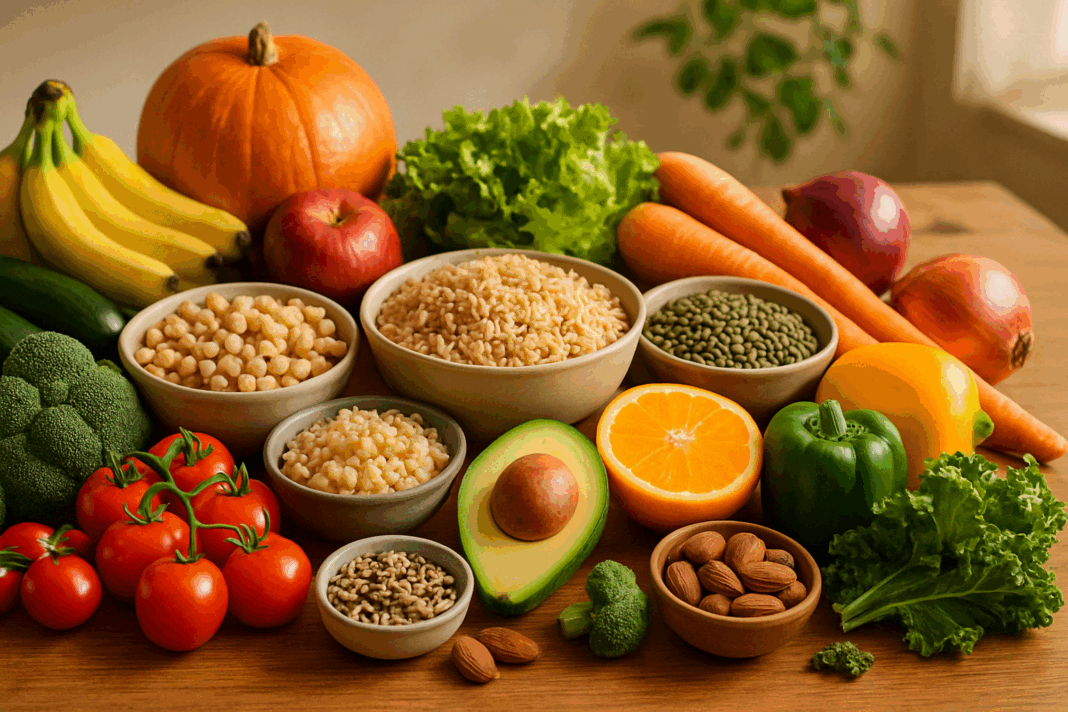In a landscape overwhelmed by fleeting diet trends and quick-fix weight loss promises, the concept of a whole foods diet stands as a beacon of sustainability, balance, and nutritional integrity. Rather than focusing on deprivation, calorie obsession, or overly restrictive food rules, eating whole foods to lose weight is about nourishing the body with what it truly needs—minimally processed, nutrient-dense ingredients that support long-term health and metabolism. This approach is not only medically supported but also aligned with how our bodies naturally function when given the right tools.
Today, increasing numbers of nutritionists, physicians, and researchers are turning to the whole foods diet as a solution for weight-related health challenges that go beyond temporary fixes. It’s not just about losing pounds—though it can be incredibly effective for that—it’s about shifting one’s entire relationship with food, appetite, and energy. This article explores why a whole foods diet is uniquely positioned to support sustainable weight loss and how adopting this lifestyle can lead to long-lasting results without compromising enjoyment or vitality.
You may also like: Smart Clean Eating for Weight Loss: Your Easy Diet Plan with a Free Diet Guide to Get Started
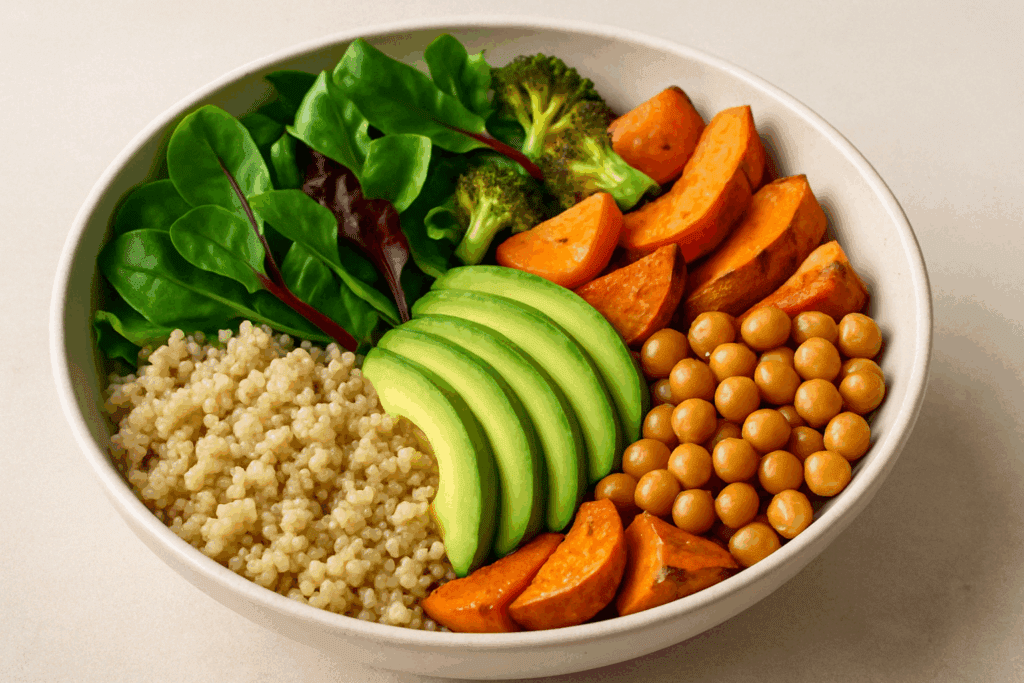
Understanding the Whole Foods Diet and Its Core Principles
A whole foods diet is rooted in simplicity and nature. It emphasizes the consumption of foods that are as close as possible to their natural state—think fruits, vegetables, whole grains, legumes, nuts, seeds, and minimally processed plant-based proteins. The goal is to reduce or eliminate foods that have been heavily refined or altered, particularly those with added sugars, synthetic preservatives, artificial flavors, or industrial seed oils. This nutritional approach is fundamentally about quality over quantity and recognizes that not all calories are created equal.
At the core of the whole foods diet is the belief that food should be functional and foundational. In other words, what we eat should not only provide energy but also actively contribute to our overall wellness. This includes regulating hormones, supporting immune function, fueling the microbiome, and assisting in the body’s natural detoxification processes. When these systems are working in harmony, weight regulation becomes less about willpower and more about physiology. This is one of the reasons why weight loss on a whole food diet often feels more natural and sustainable compared to restrictive diets that leave the body undernourished and hormonally imbalanced.
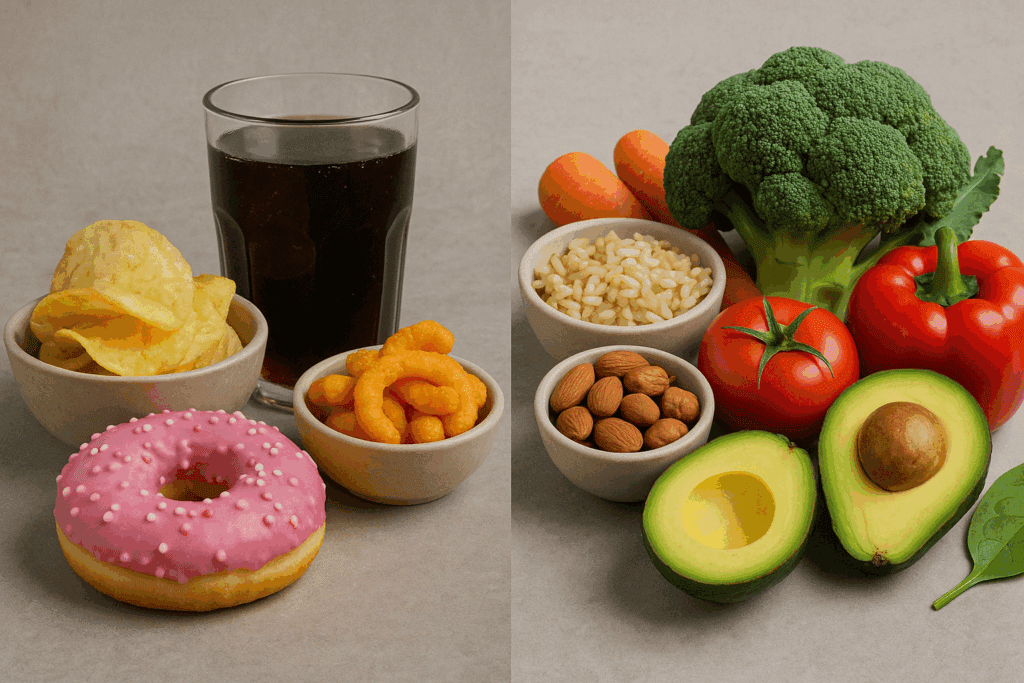
Why Processed Foods Sabotage Sustainable Weight Loss
One of the primary obstacles to healthy, lasting weight loss is the overconsumption of ultra-processed foods—products that are engineered to be hyper-palatable, shelf-stable, and addictive. These items often contain a harmful combination of refined carbohydrates, unhealthy fats, and added sugars that disrupt appetite regulation, spike insulin levels, and contribute to inflammation. When the body is repeatedly exposed to these triggers, it enters a state of metabolic dysfunction that not only promotes fat storage but also makes it exceedingly difficult to burn that fat efficiently.
This is where the contrast with a whole foods diet becomes most evident. Unlike processed foods, whole foods deliver fiber, antioxidants, phytonutrients, and healthy fats in a balanced matrix that slows digestion, stabilizes blood sugar, and enhances satiety. For example, eating an apple provides fiber, water, and a modest amount of natural sugar in a form the body can metabolize steadily. Eating the same amount of sugar in the form of apple-flavored candy, by contrast, leads to a rapid glucose spike followed by a crash, setting the stage for hunger and overeating.
When individuals begin eating whole foods to lose weight, they often experience a dramatic shift in appetite control. Cravings decrease, energy levels stabilize, and meals become more satisfying without the need for excessive portion sizes. These physiological changes are crucial for long-term weight regulation and are part of why weight loss on a whole food diet tends to be more enduring.
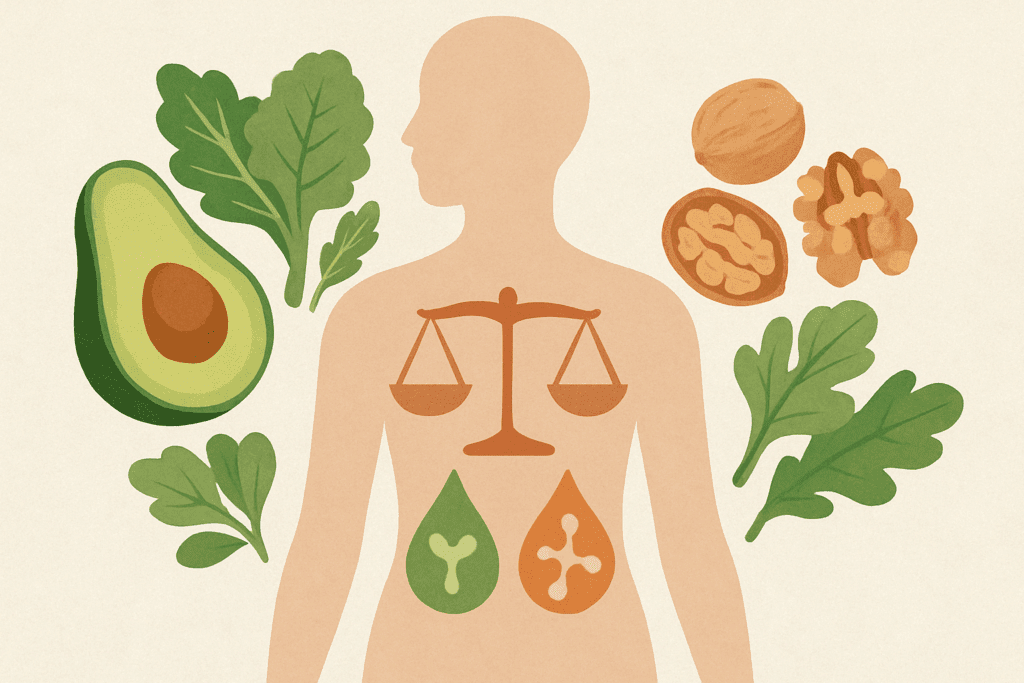
How a Whole Foods Diet Affects Metabolism and Hormones
Weight regulation is intricately linked to hormonal signals that govern hunger, fullness, fat storage, and energy expenditure. Two of the most influential hormones in this equation are insulin and leptin. Insulin facilitates the uptake of glucose into cells, and when it is chronically elevated due to a high intake of refined carbohydrates, the body is more likely to store fat and less likely to burn it. Leptin, meanwhile, communicates with the brain to signal satiety and manage fat reserves. When leptin signaling becomes impaired—a common consequence of poor diet and inflammation—people may overeat without feeling full.
A whole foods diet supports healthy hormone function by minimizing the intake of foods that cause hormonal disruptions and by providing the nutrients necessary to restore balance. For instance, magnesium, zinc, and omega-3 fatty acids—found abundantly in whole plant foods—play important roles in insulin sensitivity and leptin signaling. Fiber-rich foods like lentils, oats, and leafy greens slow carbohydrate absorption, preventing blood sugar spikes and reducing insulin load.
Moreover, weight loss on a whole food diet does not rely on calorie counting alone. It leverages the body’s natural mechanisms for hunger and fullness, allowing individuals to eat until satisfied without overeating. This is a powerful distinction because it shifts the focus from external control (counting calories) to internal regulation (listening to hunger cues), which is more sustainable and psychologically supportive in the long run.
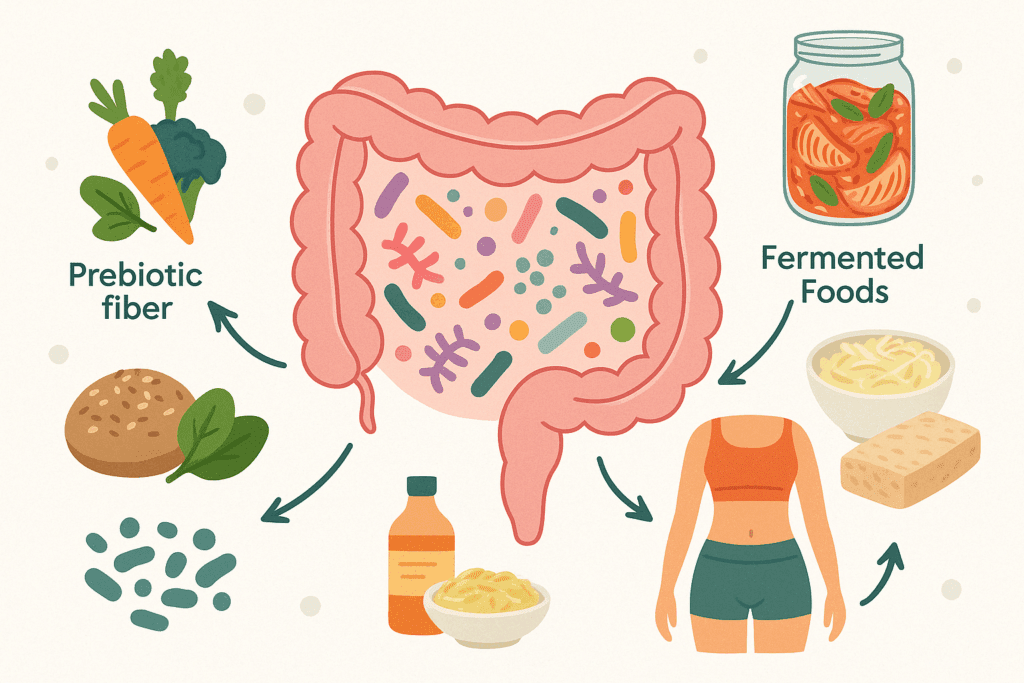
The Role of Gut Health in Whole Foods-Based Weight Loss
Emerging research in nutritional science continues to affirm the central role of the gut microbiome in weight regulation. The trillions of microorganisms that reside in the digestive tract are responsible for metabolizing nutrients, producing short-chain fatty acids, regulating inflammation, and influencing everything from mood to immune function. Diets high in processed foods, sugar, and additives can disrupt this delicate ecosystem, promoting the growth of harmful bacteria that contribute to weight gain and metabolic disease.
In contrast, eating whole foods to lose weight nurtures a healthy and diverse microbiome. Whole plant foods provide prebiotic fibers—non-digestible carbohydrates that serve as fuel for beneficial gut bacteria. Fermented foods like kimchi, sauerkraut, and tempeh further enrich the gut with probiotics that enhance digestive health. Together, these components create a symbiotic environment in which the body can better extract nutrients, manage inflammation, and maintain a healthy weight.
What’s particularly compelling is that individuals who transition to a whole foods diet often report improved digestion, reduced bloating, and enhanced mood—all of which are associated with better weight regulation. This reinforces the idea that successful, sustainable weight loss is about more than just eating less. It’s about feeding the body in a way that promotes internal balance and optimal function from the inside out.

Practical Strategies for Transitioning to a Whole Foods Diet
Although the idea of adopting a whole foods diet may sound straightforward, the practical shift can feel overwhelming, especially for those accustomed to processed convenience foods. One of the first and most effective strategies is to start by upgrading rather than overhauling. Instead of focusing on what needs to be eliminated, focus on what can be added. Adding more vegetables to dinner, swapping white rice for quinoa, or replacing sugary cereal with steel-cut oats are small but impactful steps that begin the transition.
Another helpful approach is to shop the perimeter of the grocery store, where fresh produce, whole grains, and unprocessed proteins are typically found. Preparing meals at home is also essential, as it allows for control over ingredients and reduces exposure to added sugars and artificial preservatives. Batch cooking and meal prepping on weekends can make it easier to stay consistent throughout the week, even on busy days.
It’s also worth acknowledging that eating whole foods to lose weight is not about perfection—it’s about consistency. Progress, not purity, is the goal. Giving oneself permission to enjoy food without guilt, while continuing to make thoughtful choices, is vital to maintaining motivation and a positive relationship with eating. Over time, these habits become second nature, and the process of meal planning, cooking, and eating whole foods becomes not only manageable but enjoyable.

The Psychological Benefits of a Whole Foods Lifestyle
Beyond the physical benefits, a whole foods diet offers profound psychological advantages. Many individuals find that once they are no longer caught in the cycle of sugar highs and lows or processed food cravings, their emotional relationship with food begins to heal. Rather than viewing meals as a source of stress, temptation, or guilt, eating becomes an act of self-care and nourishment.
This shift is significant because sustainable weight loss is as much about mindset as it is about metabolism. A person who feels empowered by their food choices, who experiences pleasure in eating and confidence in their body’s signals, is far more likely to maintain a healthy weight than someone who is constantly at war with food. The mindfulness cultivated through whole food eating often extends to other areas of life, fostering greater self-awareness, resilience, and balance.
Mindful eating—slowing down, savoring flavors, paying attention to hunger and fullness cues—is a natural byproduct of consuming foods that require preparation and engagement. Fast food and snacks tend to be mindless by design, encouraging consumption without thought. In contrast, preparing a roasted vegetable quinoa bowl or making a fresh green smoothie invites intention. This presence at mealtime not only improves digestion but also enhances satisfaction and supports weight regulation by preventing overeating.
Long-Term Sustainability and Lifestyle Integration
The most compelling argument in favor of the whole foods diet for weight management is its sustainability. Unlike diets that rely on extreme restrictions, meal replacements, or artificial limitations, the whole foods approach is inherently adaptable. It can be tailored to personal preferences, cultural traditions, and seasonal availability. Whether one prefers Mediterranean flavors, Asian stir-fries, or Latin American cuisine, the principles of whole food eating can be honored without sacrificing variety or enjoyment.
Sustainability also extends to one’s social life and sense of well-being. Because the whole foods diet is flexible and inclusive, it allows for shared meals with family and friends, participation in cultural celebrations, and the enjoyment of occasional indulgences. This inclusive nature helps to eliminate the “all-or-nothing” mindset that often leads to burnout on traditional weight loss programs.
As individuals become more attuned to the benefits of eating whole foods to lose weight—improved energy, clearer skin, better sleep, stable mood, and more—they become intrinsically motivated to maintain the habit. These non-scale victories are often more meaningful and reinforcing than numbers on a scale. The end result is a lifestyle that supports not just a healthier weight, but a healthier, more vibrant life overall.
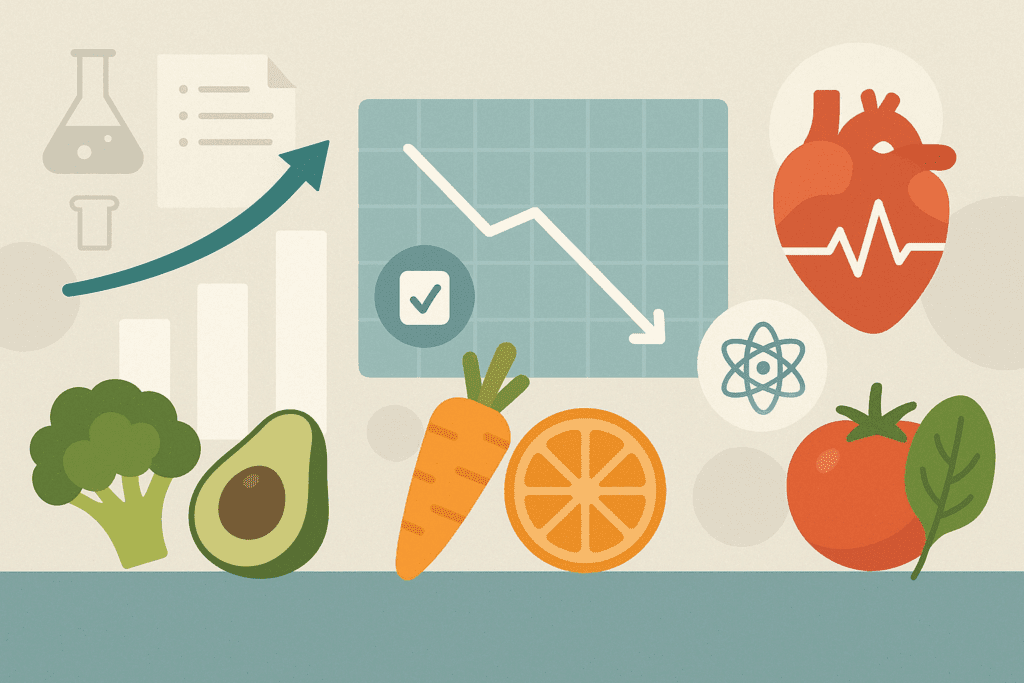
Scientific Evidence Supporting Weight Loss on a Whole Food Diet
Scientific studies continue to reinforce the efficacy of a whole foods diet for weight loss and metabolic health. Research published in journals such as The New England Journal of Medicine, JAMA, and The Lancet has demonstrated that diets rich in whole, plant-based foods are associated with lower body mass index (BMI), reduced incidence of type 2 diabetes, and improved cardiovascular outcomes. Importantly, these studies also highlight improved dietary adherence, meaning participants were more likely to stick with the eating pattern over time.
One landmark study known as the BROAD Study, conducted in New Zealand, placed overweight and obese participants on a low-fat whole food plant-based diet. The results showed significant and sustained weight loss at six and twelve months, without the need for calorie counting or portion control. Participants also reported improved quality of life and decreased reliance on medications. These outcomes suggest that weight loss on a whole food diet is not only achievable but also comes with wide-ranging health benefits.
Other studies have examined the impact of fiber, which is found exclusively in plant foods and is typically lacking in the standard American diet. Fiber has been shown to promote satiety, reduce overall calorie intake, and feed beneficial gut bacteria—all of which contribute to weight regulation. The combination of high nutrient density, natural fiber, and balanced macronutrients in whole foods is a potent formula for sustainable weight management.
Frequently Asked Questions (FAQ): How a Whole Foods Diet Supports Sustainable Weight Loss
1. Can a whole foods diet support weight loss even without counting calories or tracking macros?
Absolutely. One of the most compelling aspects of a whole foods diet is that it naturally encourages portion control through improved satiety and blood sugar regulation. Because whole foods are rich in fiber, water, and nutrients, they take longer to digest and leave you feeling full longer, reducing the likelihood of overeating. This biological feedback loop means that eating whole foods to lose weight can be effective even without logging every calorie or gram of fat. People often underestimate how taxing calorie counting can be psychologically; the whole foods approach relieves that burden by focusing on quality rather than restriction. Over time, this intuitive style of eating supports lasting weight loss on a whole food diet without the burnout that accompanies many traditional tracking-based regimens.
2. How can someone overcome emotional eating when transitioning to a whole foods diet?
Emotional eating is a common challenge, especially when food has become a coping mechanism for stress, loneliness, or boredom. A whole foods diet can help interrupt this cycle by stabilizing blood sugar and improving mood through nutrient-dense meals, but it’s also essential to address the emotional component directly. Many find success by pairing the dietary shift with mindfulness practices such as journaling, meditation, or therapy. Interestingly, certain whole foods—such as leafy greens, legumes, and nuts—are rich in magnesium and B vitamins, which support neurotransmitter function and emotional resilience. When eating whole foods to lose weight, consider the emotional nourishment you’re gaining, not just the physical benefits; this mindset shift can help reframe food as a tool for healing rather than escape.
3. What role does social support play in sustaining weight loss on a whole food diet?
Social support can dramatically increase the likelihood of success with any lifestyle change, especially one as comprehensive as a shift to a whole foods diet. Sharing meals, recipes, and progress with others can make the process feel less isolating and more enjoyable. Many communities have local or online groups dedicated to eating whole foods to lose weight, where members exchange practical tips and encouragement. Involving family or friends in meal preparation can also strengthen relationships while reinforcing healthy habits. When individuals feel seen and supported in their journey, adherence improves, making sustainable weight loss on a whole food diet more attainable and emotionally fulfilling.
4. Are there advanced strategies to enhance fat loss specifically while following a whole foods diet?
Yes, several advanced techniques can be used within a whole foods framework to optimize fat loss. For instance, meal timing strategies like early time-restricted eating—finishing dinner by early evening—may amplify the fat-burning effects of a whole foods diet by aligning with circadian rhythms. Additionally, emphasizing thermogenic foods such as chili peppers, ginger, or green tea can slightly boost metabolism when incorporated mindfully. Prioritizing protein-rich whole foods like lentils, tempeh, and quinoa during meals also helps preserve lean muscle mass while promoting fat loss. When strategically combined, these enhancements can accelerate weight loss on a whole food diet without compromising nutritional quality or sustainability.
5. How does a whole foods diet influence long-term metabolic health beyond just weight loss?
While weight loss on a whole food diet is a notable benefit, the metabolic advantages go far deeper. Whole foods nourish the body with antioxidants and anti-inflammatory compounds that reduce oxidative stress—a key driver of insulin resistance and metabolic syndrome. Over time, this reduces the risk of chronic conditions such as type 2 diabetes, fatty liver disease, and cardiovascular dysfunction. Furthermore, consistent consumption of fiber from whole plant foods supports stable glucose levels and lowers cholesterol, improving the metabolic profile even in individuals who aren’t actively losing weight. The long-term result of eating whole foods to lose weight is often a more efficient, resilient metabolism that better handles stress, hormonal shifts, and aging.
6. Can a whole foods diet be customized for different cultural or dietary preferences?
Absolutely, one of the strengths of a whole foods diet is its flexibility and cultural adaptability. Whether you’re following a Mediterranean, Asian, Latin American, or African-inspired eating pattern, it’s entirely possible to build your meals around whole, minimally processed ingredients. The key is focusing on the core principles—avoiding refined sugars, flours, and synthetic additives—while incorporating herbs, spices, and cooking techniques that align with your heritage or culinary preferences. This inclusivity makes eating whole foods to lose weight a much more sustainable and enjoyable experience, especially when it honors one’s identity and traditions. Personalization not only enhances adherence but also fosters a deeper emotional connection to the food you eat.
7. How does stress affect the effectiveness of a whole foods diet for weight loss?
Chronic stress can significantly blunt the results of any weight loss strategy, including a whole foods diet. Stress triggers the release of cortisol, a hormone that promotes fat storage—especially around the abdomen—and can lead to increased cravings for calorie-dense, processed foods. Even when eating whole foods to lose weight, unresolved stress can result in mindless snacking or disrupted sleep, which undermines metabolic health. Incorporating stress-reducing habits such as breathwork, walking in nature, or practicing yoga can enhance the effectiveness of the whole foods approach. In this way, holistic wellness practices amplify the physiological benefits of a whole foods diet, supporting a more complete transformation.
8. Is it more expensive to follow a whole foods diet long-term, and how can it be done affordably?
While certain organic or specialty whole food products can be pricey, a whole foods diet does not have to be expensive. Staples like beans, lentils, brown rice, oats, and frozen vegetables are often significantly cheaper than processed meals or restaurant fare. Shopping at local farmers markets, buying in bulk, and planning meals around seasonal produce are all effective strategies for eating whole foods to lose weight without breaking the bank. Investing time in cooking at home also reduces reliance on convenience foods, which tend to carry hidden costs. Over time, the potential health savings—fewer medications, fewer doctor visits, and less time lost to illness—make the whole foods approach one of the most cost-effective lifestyle investments.
9. What should I expect in the first few weeks of switching to a whole foods diet for weight loss?
The initial transition to a whole foods diet can bring both rewards and challenges. Many people report increased energy, improved digestion, and clearer thinking within the first two weeks. However, it’s also common to experience temporary symptoms like headaches, cravings, or fatigue—especially if the previous diet was high in sugar or caffeine. These short-term effects are often signs that the body is recalibrating, adjusting to the nutrient-dense, fiber-rich nature of whole foods. Sticking with the plan during this adjustment period is crucial, as weight loss on a whole food diet tends to accelerate once metabolic and digestive systems stabilize. Hydration, gentle movement, and adequate sleep can ease this transition and set the stage for long-term success.
10. How can someone maintain weight loss after reaching their goal on a whole foods diet?
Maintenance is often the most overlooked phase of any weight loss journey, yet it’s where sustainability truly proves itself. The good news is that a whole foods diet naturally lends itself to maintenance because it’s designed to be a lifelong pattern, not a temporary fix. After achieving your goal, the focus can shift from active fat loss to performance, vitality, and disease prevention. This may involve adjusting portion sizes, introducing more complex meals, or exploring new whole foods to keep the routine fresh and satisfying. Ultimately, eating whole foods to lose weight creates habits and preferences that support weight stability effortlessly, reducing the likelihood of regaining the weight and reinforcing a positive, health-forward identity.
Conclusion: Why Eating Whole Foods to Lose Weight Is the Healthiest, Most Sustainable Path Forward
In an age where dietary confusion is widespread and quick-fix solutions dominate headlines, returning to the basics of a whole foods diet offers clarity, consistency, and credibility. By emphasizing foods in their natural state and minimizing processed, artificial, and nutrient-poor items, individuals can achieve weight loss that is not only effective but also sustainable, nourishing, and empowering. The benefits extend far beyond the number on the scale, encompassing metabolic balance, digestive health, mental clarity, and emotional resilience.
Weight loss on a whole food diet is not about restriction—it’s about restoration. It restores our relationship with food, rebuilds our trust in the body’s signals, and reclaims health in a way that feels intuitive and lasting. For those seeking a science-backed, experience-driven path to wellness, eating whole foods to lose weight offers a meaningful solution that aligns with both medical evidence and lived experience.
This approach honors the complexity of the human body and the individuality of each person’s journey. It invites us to slow down, make conscious choices, and reconnect with food as a source of life, not just a means to an end. For anyone ready to step off the dieting roller coaster and embrace a healthier way of living, the whole foods path is not just a diet—it’s a sustainable, transformative lifestyle.
Was this article helpful? Don’t let it stop with you. Share it right now with someone who needs to see it—whether it’s a friend, a colleague, or your whole network. And if staying ahead on this topic matters to you, subscribe to this publication for the most up-to-date information. You’ll get the latest insights delivered straight to you—no searching, no missing out.
Further Reading:
Science-Backed Tips to Lose Weight Fast and Sustainably
Disclaimer
The information contained in this article is provided for general informational purposes only and is not intended to serve as medical, legal, or professional advice. While NewsHealthWatch strives to present accurate, up-to-date, and reliable content, no warranty or guarantee, expressed or implied, is made regarding the completeness, accuracy, or adequacy of the information provided. Readers are strongly advised to seek the guidance of a qualified healthcare provider or other relevant professionals before acting on any information contained in this article. NewsHealthWatch, its authors, editors, and contributors expressly disclaim any liability for any damages, losses, or consequences arising directly or indirectly from the use, interpretation, or reliance on any information presented herein. The views and opinions expressed in this article are those of the author(s) and do not necessarily reflect the official policies or positions of NewsHealthWatch.

